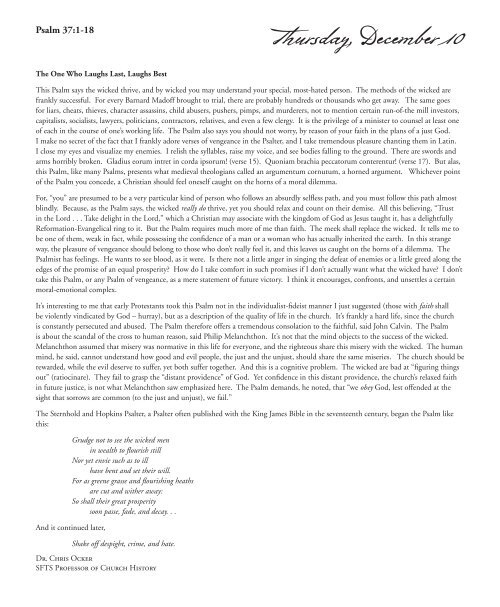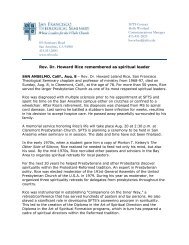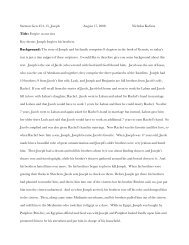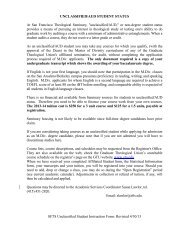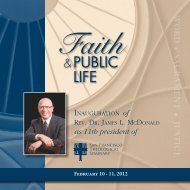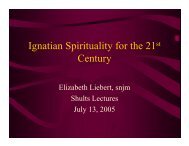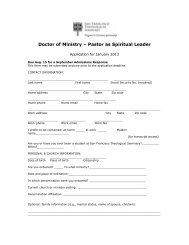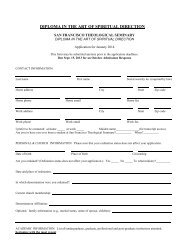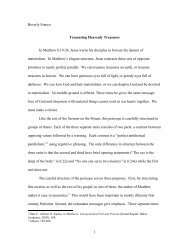Advent Devotional Resource - San Francisco Theological Seminary
Advent Devotional Resource - San Francisco Theological Seminary
Advent Devotional Resource - San Francisco Theological Seminary
You also want an ePaper? Increase the reach of your titles
YUMPU automatically turns print PDFs into web optimized ePapers that Google loves.
Psalm 37:1-18Thursday, December 10The One Who Laughs Last, Laughs BestThis Psalm says the wicked thrive, and by wicked you may understand your special, most-hated person. The methods of the wicked arefrankly successful. For every Barnard Madoff brought to trial, there are probably hundreds or thousands who get away. The same goesfor liars, cheats, thieves, character assassins, child abusers, pushers, pimps, and murderers, not to mention certain run-of-the mill investors,capitalists, socialists, lawyers, politicians, contractors, relatives, and even a few clergy. It is the privilege of a minister to counsel at least oneof each in the course of one’s working life. The Psalm also says you should not worry, by reason of your faith in the plans of a just God.I make no secret of the fact that I frankly adore verses of vengeance in the Psalter, and I take tremendous pleasure chanting them in Latin.I close my eyes and visualize my enemies. I relish the syllables, raise my voice, and see bodies falling to the ground. There are swords andarms horribly broken. Gladius eorum intret in corda ipsorum! (verse 15). Quoniam brachia peccatorum conterentur! (verse 17). But alas,this Psalm, like many Psalms, presents what medieval theologians called an argumentum cornutum, a horned argument. Whichever pointof the Psalm you concede, a Christian should feel oneself caught on the horns of a moral dilemma.For, “you” are presumed to be a very particular kind of person who follows an absurdly selfless path, and you must follow this path almostblindly. Because, as the Psalm says, the wicked really do thrive, yet you should relax and count on their demise. All this believing, “Trustin the Lord . . . Take delight in the Lord,” which a Christian may associate with the kingdom of God as Jesus taught it, has a delightfullyReformation-Evangelical ring to it. But the Psalm requires much more of me than faith. The meek shall replace the wicked. It tells me tobe one of them, weak in fact, while possessing the confidence of a man or a woman who has actually inherited the earth. In this strangeway, the pleasure of vengeance should belong to those who don’t really feel it, and this leaves us caught on the horns of a dilemma. ThePsalmist has feelings. He wants to see blood, as it were. Is there not a little anger in singing the defeat of enemies or a little greed along theedges of the promise of an equal prosperity? How do I take comfort in such promises if I don’t actually want what the wicked have? I don’ttake this Psalm, or any Psalm of vengeance, as a mere statement of future victory. I think it encourages, confronts, and unsettles a certainmoral-emotional complex.It’s interesting to me that early Protestants took this Psalm not in the individualist-fideist manner I just suggested (those with faith shallbe violently vindicated by God – hurray), but as a description of the quality of life in the church. It’s frankly a hard life, since the churchis constantly persecuted and abused. The Psalm therefore offers a tremendous consolation to the faithful, said John Calvin. The Psalmis about the scandal of the cross to human reason, said Philip Melanchthon. It’s not that the mind objects to the success of the wicked.Melanchthon assumed that misery was normative in this life for everyone, and the righteous share this misery with the wicked. The humanmind, he said, cannot understand how good and evil people, the just and the unjust, should share the same miseries. The church should berewarded, while the evil deserve to suffer, yet both suffer together. And this is a cognitive problem. The wicked are bad at “figuring thingsout” (ratiocinare). They fail to grasp the “distant providence” of God. Yet confidence in this distant providence, the church’s relaxed faithin future justice, is not what Melanchthon saw emphasized here. The Psalm demands, he noted, that “we obey God, lest offended at thesight that sorrows are common (to the just and unjust), we fail.”The Sternhold and Hopkins Psalter, a Psalter often published with the King James Bible in the seventeenth century, began the Psalm likethis:Grudge not to see the wicked menin wealth to flourish stillNor yet envie such as to illhave bent and set their will.For as greene grasse and flourishing heathsare cut and wither away:So shall their great prosperitysoon passe, fade, and decay. . .And it continued later,Shake off despight, crime, and hate.Dr. Chris OckerSFTS Professor of Church History


